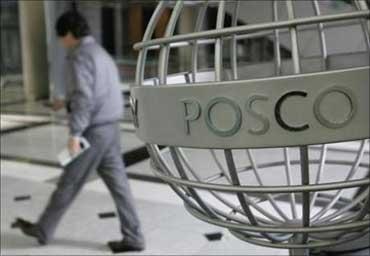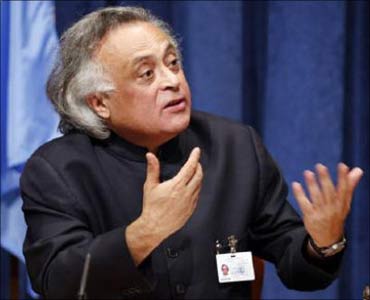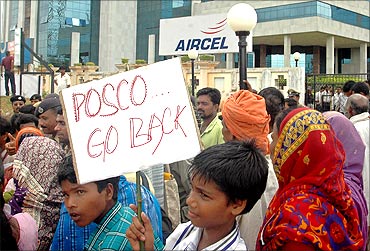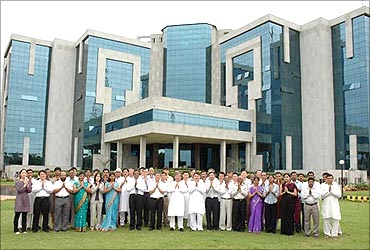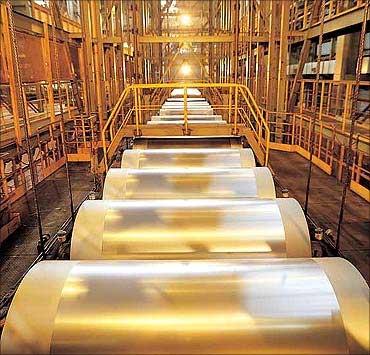 | « Back to article | Print this article |
Of Posco, responsible investing and reality
What is urgently needed are transparent and highly credible mechanisms for mapping actual impacts on the ground -- and sifting the truth from claims made by different sides of the dispute, says Rajni Bakshi. The Union environment ministry's go ahead for Posco's $12-billion steel factory in Orissa was predictably greeted by equally loud booing and cheering.
As reported by Rediff.com earlier, Union Minister for Environment and Forests Jairam Ramesh has given conditional green clearance for the steel-cum-captive-power plant and a captive minor port -- which will require diversion of 1253 hectares of forest land for the project.
Those who are of the view that economic growth must get priority over concerns about social and environmental disruptions are relieved by approval for Posco's project.
But their relief may be short-lived because those who insist that human rights and ecological sustainability are severely compromised by this project have vowed to intensify their protests.
Ironically what has gone largely unnoticed is that just eleven days before the ministry came out in favour of Posco, a multi-stakeholder dialog on 'Responsible Investment' was held in Mumbai on January 19, 2011.
Senior government officials, corporate leaders, academics, bankers and representatives of stock exchanges -- from different countries --discussed the details of how environmental, social and governance (ESG) disclosures should be integrated into all investment strategies.
"The event concluded with unanimous agreement that there must be a paradigm shift in the way business and investor roles and responsibilities are perceived in India" says a report on the event by the Global Reporting Initiative -- Focal Point India, one of the organisers of the dialogue.
Click NEXT to read on . . .
Of Posco, responsible investing and reality
The Global Reporting Initiative (GRI) is an international network that pioneered the world's most widely used sustainability reporting framework.
There is clearly a stark contrast between such discussions and the ground reality.
For example, Posco has in the past published elaborate sustainability reports and been part of networks like the GRI.
Its India managing director G W Sung has been reported to say that the company will make efforts to conserve the land and marine environment around the site and find sustainable options for residents to maintain their livelihoods.
But why then is there acute distress on the ground -- that has been documented both by journalistic accounts and teams appointed by the government?
Within days of giving conditional but final approval to the Posco project, Jairam Ramesh received a letter of protest from an activist organisation called the Mining Zone Peoples' Solidarity Group.
The letter asks how Posco's project can be approved when three different expert committees appointed by the ministry of environment and forests (MoEF) have identified several serious problems, which remain unresolved.
Click NEXT to read on . . .
Of Posco, responsible investing and reality
For instance, says the group's letter, the MoEF committees found that the Orissa government withheld relevant information and documents regarding traditional forest dwellers in the region.
Thus all legally tenable claims under the Forest Rights Act have not been properly processed.
"We cannot understand why you (Jairam Ramesh) would privilege the claims of the Orissa government over those of the people whose lives would be destroyed, especially when the same Orissa government has consistently shown utter contempt for the law, and disregard for its own citizens as is evident from its attempts to ruthlessly suppress peaceful protests against the project" says the letter from the Solidarity Group.
Among other things the letter also reiterates some of the apprehensions outlined by the MoEF's expert committees:
- Possible submergence of the thriving Paradeep port by Posco's proposed captive port; and
- Exacerbation of the existing water crises in the Mahanadi delta and in Keonjhar.
Supporters of the project claim that the $12 billion invested by Posco will help create 8.7 lakh (870,000) direct and indirect jobs.
Click NEXT to read on . . .
Of Posco, responsible investing and reality
Activist groups challenge these estimates and say that no more 17,000 direct and indirect jobs, spread over the next 5-10 years, will be generated by the project.
Supporters of the project see its clearance as a positive signal to the 'international investor community'.
Activist groups draw attention to other dimensions of the 'international community' -- namely global activist networks which mobilize support to protect human rights, labour standards and work for sustainable development.
That multi-stakeholder dialog in Mumbai last month is part of a global process to try and find a middle ground between purely profit driven companies and activists who fight for social and environmental issues but do not engage with challenges of economic growth.
One of the motivations behind such initiatives is that far too many projects get delayed because of negative social and environmental impacts. Posco's Orissa project has been delayed by almost five years.
As the GRI's report on the dialog noted, one of the major impediments to combining these concerns has been the lack of non-financial data that is consistently available and comparable.
More importantly says the report on the Mumbai dialog: "The voluntary disclosure adopted by some companies is a positive sign but regulatory intervention may be needed for the mandatory approach to be introduced in a phased manner."
Click NEXT to read on . . .
Of Posco, responsible investing and reality
For instance, the National Stock Exchange now has an ESG rating index. But being listed on it is not mandatory.
So dialogues like the one held in Mumbai are good news to the extent that they discredit a business culture which is driven to seek profit at any human cost.
But unless such initiatives also engage directly with details of specific projects such processes are of limited or no benefit to people whose habitats and livelihoods are immediately under threat.
What is urgently needed are transparent and highly credible mechanisms for mapping actual impacts on the ground -- and sifting the truth from claims made by different sides of the dispute.
Otherwise an erroneous impression persists -- that we can either have economic growth or social-environmental sustainability but not both.
The truth is closer to what one global corporate leader once said: "Sustainability is here to stay or we won't be."
